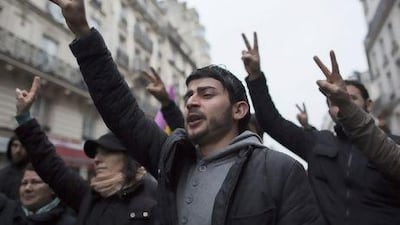PARIS/ISTANBUL // Three female Kurdish activists, including a co-founder of the Kurdistan Workers' Party, were assassinated in Paris yesterday in what police called an execution-style shooting.
The killings took place after fresh peace talks last month between Turkey and the Kurdistan Workers' Party (PKK), the most comprehensive attempt in years to end the decades-old Kurdish conflict.
Recep Tayyip Erdogan, the Turkish prime minister, said the killings could have been the result of internal PKK feuding, or an "attempted provocation" directed against his government's initiative for talks with the party chief, Abdullah Ocalan.
On a visit to Senegal yesterday, Mr Erdogan said he would wait for the results of the police investigation before making definite statements, the Turkish Anadolu news agency reported. But he said his government would stick to its peace initiative.
"We will continue to take steps," Mr Erdogan said.
An organisation under the PKK, which has been fighting since 1984 for autonomy in a conflict claiming about 45,000 lives, accused Turkish security of carrying out the murders in an effort to wreck the talks.
The women were found in the early hours inside a Kurdish information centre in Paris's 10th district.
ANF news agency, a PKK mouthpiece, reported one of the victims was Sakine Cansiz, 55, a founder of the party.
Another was reported by the French Federation of Kurdish Associations (Feyka) to be Fidan Dogan, 32, who ran the information centre and acted as the representative in France of the Brussels-based National Congress of Kurdistan.
The third victim was a young activist identified as Leyla Soylemez, in her 20s.
Although there were conflicting reports, police sources said each had been killed by a bullet to the head.
The French interior minister, Manuel Valls, said after visiting the scene that the victims were "without doubt executed".
Mr Valls said the anti-terrorism and anti-crime brigades would do all possible to shed light on the shootings.
The BBC described Cansiz as a former commander of the women's guerrilla movement in Kurdish areas of northern Iraq, who had been jailed in Turkey but later moved to lead the PKK women's movement in Europe.
Soylemez was said to be a junior activist working on diplomatic relations and as a PKK women's representative.
"These assassinations are intolerable," Mr Valls told France-Info radio. "I hope the inquiry will make rapid progress but let's allow the investigators to do their work."
A police source was quoted by AFP as saying the crime scene "could give rise to the idea that this was an execution", although the exact circumstances had yet to be determined.
The last reported sighting of the women alive was inside the institute at midday on Wednesday. Feyka sources were quoted as saying the three were believed to have been shot later in the afternoon and the killer or killers used guns fitted with silencers.
A Feyka official told the daily newspaper Le Parisien that the alarm was raised after the partner of one of the women was unable to contact her. He rushed to the institute but could not gain access because he did not have the keys.
The bodies were later found on the first floor of the building.
A Feyka representative who knew the women, Leon Edart, told the French BFM news channel it seemed neighbours had heard nothing of the attack. He said the office was not equipped with closed-circuit TV cameras.
Feyka called for a demonstration in Paris but in spontaneous protests outside the building, a group of up to 300 Kurds chanted slogans including "Turkey assassin, [French president Francois] Hollande accomplice".
Members of Turkey's intelligence service MIT last month met the jailed PKK leader Abdullah Ocalan on the prison island of Imrali near Istanbul.
The talks, aimed at disarming the PKK and ending three decades of violence in Turkey's Kurdish region, are scheduled to continue and could also be flanked by talks between the MIT and PKK leaders in northern Iraq, Mr Erdogan has said.
Efforts between the Erdogan government and the PKK in 2010 and 2011 ended without agreement. The talks on Imrali mark the first time Ankara has negotiated with Ocalan himself.
The initiative has enjoyed broad support from Turkish and Kurdish groups. More than 200 associations and non-governmental groups in Diyarbakir, Turkey's biggest Kurdish city, yesterday announced their support for the talks.
Tahir Elci, the head of the Diyarbakir bar association, said a solution for the Kurdish conflict was a "social need". He said "provocative actions" such as the killings in Paris should not be allowed to hurt the negotiation process.
The Union of Communities in Kurdistan, an organisation tied to the PKK, blamed the Paris assassinations on "Turkish colonialism" and on "Turkish deep state forces".
Deep state is a term describing radical groups within Turkey's security apparatus that have been blamed for extrajudicial killings and other acts of violence in the Kurdish region.
Huseyin Celik, a spokesman for Mr Erdogan's ruling Justice and Development Party, said the killings looked like the result of an internal PKK vendetta.
The PKK no longer wants a separate state for the Kurds in south-eastern Anatolia, but is calling for more rights for the estimated 12 million Kurds within Turkey.
Those rights include Kurdish language education, a formal recognition of a separate Kurdish identity in the constitution and more regional autonomy.
Mr Erdogan said this week Ankara wanted the PKK, which is based in northern Iraq, to withdraw its fighters from Turkey.
Sahin Alpay, a professor of political science at Istanbul's Bahcesehir University, said the Imrali talks represented the best chance for peace in years.
An estimated 150,000 people of Kurdish origin live in France, according to a 2006 study.
foreign.desk@thenational.ae

